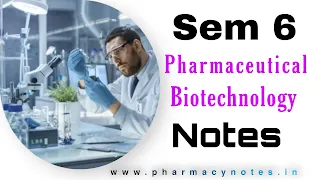Semester 6
BP 605 T. PHARMACEUTICAL BIOTECHNOLOGY (Theory)
Scope:
• Scientific application of biotechnology in the field of genetic engineering, medicine, and fermentation technology makes the subject interesting.
• Biotechnology is leading to new biological revolutions in diagnosis, prevention, and cure of diseases, new and cheaper pharmaceutical drugs.
• Biotechnology has already produced transgenic crops and animals and the future promises lot more.
• It is basically a research-based subject.
Objectives:
Upon completion of the subject student shall be able to;
2. Genetic engineering applications in relation to the production of pharmaceuticals
3. Importance of Monoclonal antibodies in Industries
4. Appreciate the use of microorganisms in fermentation technology
Unit I
b) Enzyme Biotechnology- Methods of enzyme immobilization and applications.
c) Biosensors- Working and applications of biosensors in Pharmaceutical Industries.
d) Brief introduction to Protein Engineering.
e) Use of microbes in industry. Production of Enzymes- General consideration - Amylase, Catalase, Peroxidase, Lipase, Protease, Penicillinase.
f) Basic principles of genetic engineering.
Unit II
b) Recombinant DNA technology. Application of genetic engineering in medicine.
c) Application of r DNA technology and genetic engineering in the production of:
- i) Interferon
- ii) Vaccines- hepatitis- B
- iii) Hormones-Insulin.
Unit III
a) Structure of Immunoglobulins
b) Structure and Function of MHC
c) Hypersensitivity reactions, Immune stimulation, and Immune suppressions.
d) General method of the preparation of bacterial vaccines, toxoids, viral vaccine, antitoxins, serum-immune blood derivatives, and other products relative to immunity. e) Storage conditions and stability of official vaccines
f) Hybridoma technology- Production, Purification and Applications
g) Blood products and Plasma Substitutes.
Unit IV
b) Genetic organization of Eukaryotes and Prokaryotes
c) Microbial genetics including transformation, transduction, conjugation, plasmids, and transposons.
d) Introduction to Microbial biotransformation and applications.
e) Mutation: Types of mutation/mutants.
Unit V
sterilization methods, aeration process, stirring.
b) Large-scale production fermenter design and its various controls.
c) Study of the production of - penicillins, citric acid, Vitamin B12, Glutamic acid, Griseofulvin,
d) Blood Products: Collection, Processing, and Storage of whole human blood, dried human plasma, plasma Substituties.
Recommended Books (Latest edition):
1. B.R. Glick and J.J. Pasternak: Molecular Biotechnology: Principles and Applications of recombinant DNA: ASM Press Washington D.C.
2. RA Goldshy et. al., : Kuby Immunology.
3. J.W. Goding: Monoclonal Antibodies.
4. J.M. Walker and E.B. Gingold: Molecular Biology and Biotechnology by Royal Society of Chemistry.
5. Zaborsky: Immobilized Enzymes, CRC Press, Degraland, Ohio.
6. S.B. Primrose: Molecular Biotechnology (Second Edition) Blackwell Scientific Publication.
7. Stanbury F., P., Whitakar A., and Hall J., S., Principles of fermentation technology, 2nd edition, Aditya books Ltd., New Delhi








Please do not enter any spam link in the comment box.